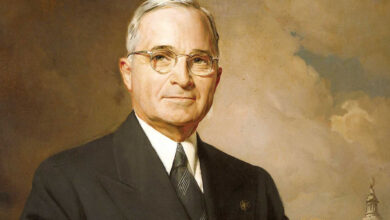Podcast: Play in new window | Download
Subscribe: Spotify | Amazon Music | Youtube Music | RSS
Gustavus Henry March-Phillipps, known affectionately as Gus, was a British military officer whose life, though tragically short, was marked by exceptional bravery, strategic innovation, and a pivotal role in shaping the landscape of British special operations during World War II. Born in England in 1908, Gus rose through the ranks of the Royal Artillery, eventually carving his name in history as the founder of the No. 62 Commando, also known as the Small-Scale Raiding Force (SSRF). This pioneering unit, a precursor to the famed Special Air Service (SAS), served as a testament to Gus’ foresight and daring leadership, conducting audacious raids behind enemy lines and leaving a lasting legacy on British military strategy.
Gus’ early life details remain somewhat obscured, but historical records indicate his birth year as 1908. Little is known about his formative years or the path that led him to pursue a military career. However, his education at Ampleforth College, a prestigious Catholic boarding school in Yorkshire, suggests a strong foundation in discipline and leadership qualities.
Gus joined the Royal Artillery, a distinguished British Army corps renowned for its artillery warfare expertise. The exact year of his enlistment is undocumented, but his service during the early years of World War II demonstrates his commitment and skill. He served with distinction in the British Expeditionary Force (BEF) during the 1940 battles for France and Belgium. His performance earned him a coveted Member of the Order of the British Empire (MBE) medal, a testament to his courage and leadership in the face of overwhelming odds.
Conventional warfare tactics’ rigid structure and limitations likely frustrated Gus’ enterprising spirit. He yearned for a more audacious approach that could exploit surprise and flexibility to inflict significant damage on the enemy. This yearning, coupled with an unwavering belief in the effectiveness of small, well-trained commando units, led him to propose the formation of a specialised raiding force.
In 1940, Gus’ vision materialised with the creation of the No. 62 Commando, or the Small-Scale Raiding Force (SSRF). Initially, this pioneering unit consisted of a mere 45 men, handpicked by Gus himself, which was a stark departure from the traditional large-scale infantry formations. The SSRF emphasised rigorous training in unconventional warfare tactics, including sabotage, infiltration behind enemy lines, and hit-and-run attacks. Gus meticulously planned operations, prioritising speed, surprise, and adaptability.
The SSRF quickly gained a reputation for daring and effectiveness. One of their most audacious exploits, Operation Postmaster in January 1942, showcased Gus’ tactical brilliance and the unit’s ability to strike at unexpected moments. The mission involved the capture of two Italian merchant ships docked in the neutral Spanish port of Santa Isabel in West Africa. The SSRF, disguised as dockworkers, successfully boarded the ships, overpowered the crews, and towed them triumphantly to Lagos, a significant British naval base. This audacious raid secured valuable resources and served as a powerful psychological blow to the Axis forces.
Gus’ leadership style was crucial to the SSRF’s success. He led from the front, inspiring his men with his courage and unwavering commitment to the mission. He meticulously planned raids, prioritising every detail while remaining flexible enough to adapt to unexpected situations. His charisma and strategic thinking fostered a strong sense of camaraderie and trust within the unit, a critical factor in the success of high-risk operations.
In recognition of his exceptional leadership and the SSRF’s achievements, Gus was awarded the Distinguished Service Order (DSO) in 1942.
Unfortunately, Gus’ life was tragically cut short just as his talents and leadership were reaching their full potential. During a raid on the French coast on September 12, 1942, known as Operation Aquatint, Gus’ team encountered fierce resistance. When their vessel sustained heavy damage, Gus attempted to swim ashore but was fatally wounded. He died at the young age of 34, leaving a void in the hearts of his men and the burgeoning British special forces community.
Gus’ legacy, however, lives on. The success of the SSRF paved the way for the establishment of elite special forces units like the SAS, which continue to play a vital role in modern warfare. His innovative tactics, emphasising small, highly-trained units focused on surprise and agility, redefined British thinking on special operations.
Beyond strategy, Gus embodied the quintessential spirit of a special forces soldier. His courage, resourcefulness, and unwavering determination in the face of danger continue to inspire generations of military personnel. His story serves as a potent reminder that leadership transcends rank and experience. Gus’ impact stemmed from his tactical brilliance and his ability to build a cohesive and motivated team. He fostered a culture of trust and mutual respect amongst his men, recognising that success hinged on their collective capabilities.
While details of Gus’ personal life are scarce, historical records reveal his marriage to Marjorie Stewart. Though their time together was undoubtedly cut short by his untimely death, their bond offers a glimpse into a different facet of Gus’ life. It suggests a man capable of love, companionship, and a desire for a life beyond the battlefield.
There remains a certain enigmatic quality surrounding Gus March-Phillipps. The shortage of personal details leaves much to the imagination. However, the historical accounts of his actions paint a vivid picture of a man who defied convention and carved his path through innovation and courage.
Though a relatively unknown figure outside military circles, Gus March-Phillipps stands as a pivotal figure in the history of British special forces. His vision, leadership, and unwavering commitment to innovation left an indelible mark on how Britain approached warfare. His story is a testament to the power of daring leadership, the effectiveness of unconventional tactics, and the enduring legacy that can be built on courage and a thirst for victory. His story serves as a reminder that even amidst the chaos and destruction of war, individuals with vision, courage, and a commitment to excellence can have a lasting impact on history.
Podcast: Play in new window | Download
Subscribe: Spotify | Amazon Music | Youtube Music | RSS




